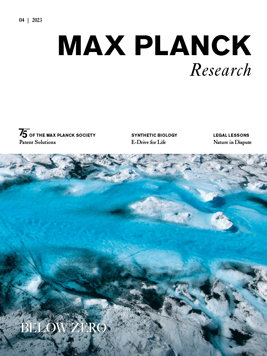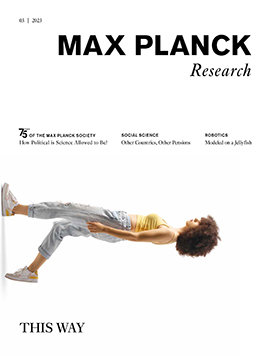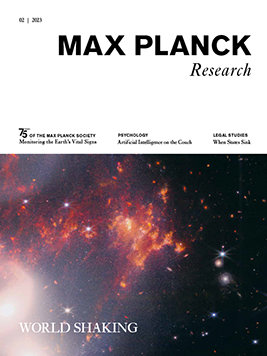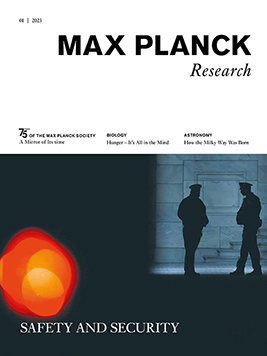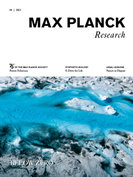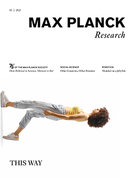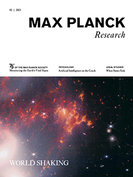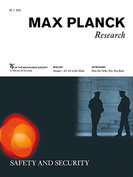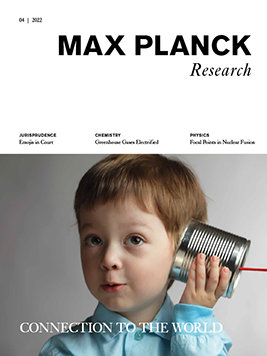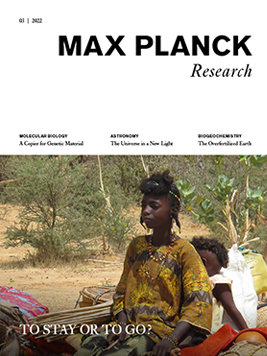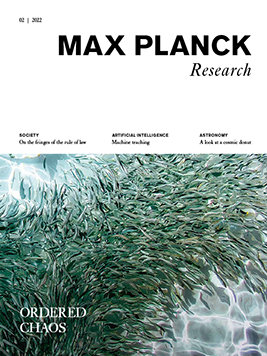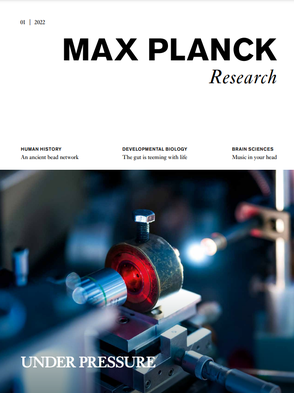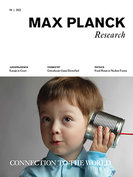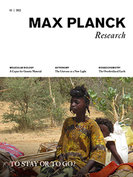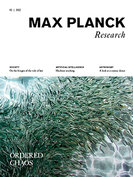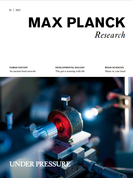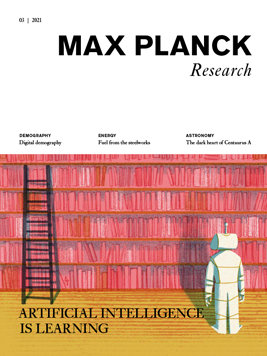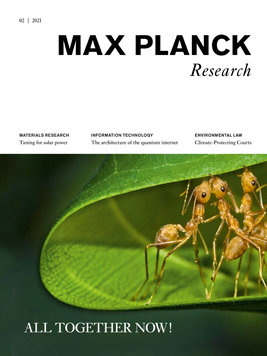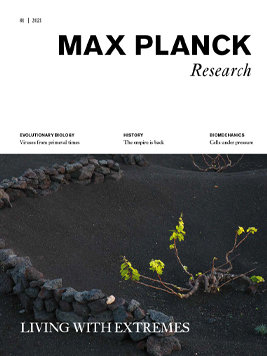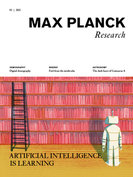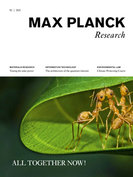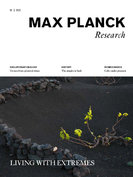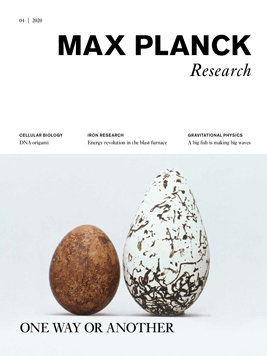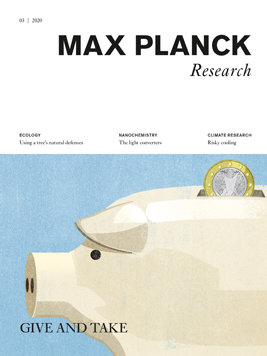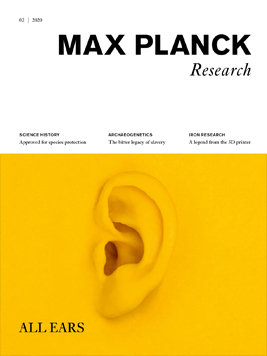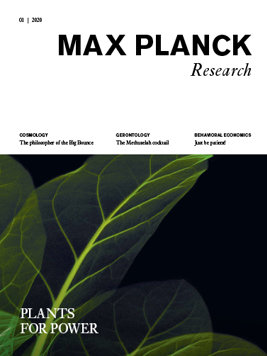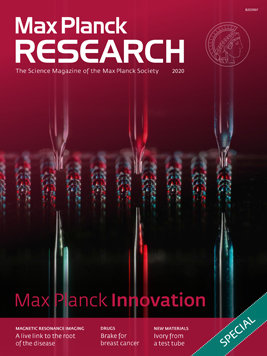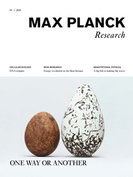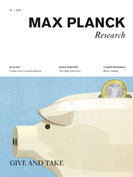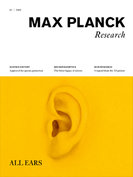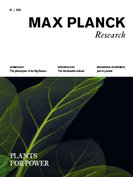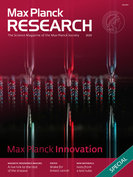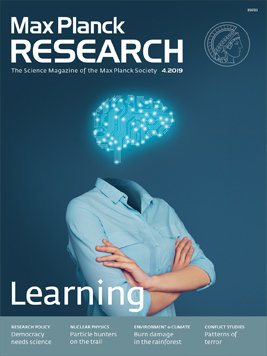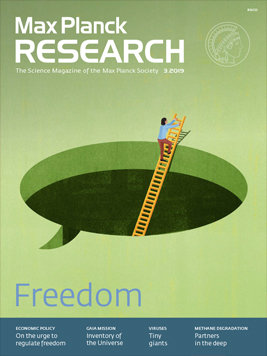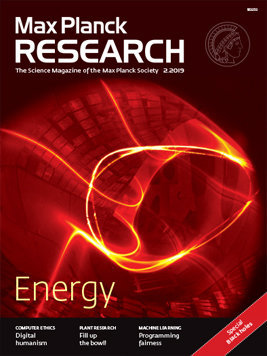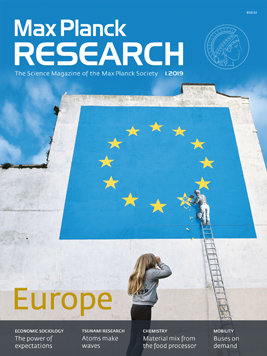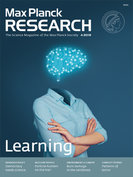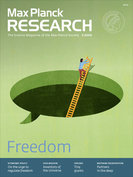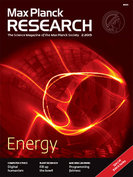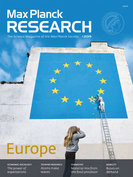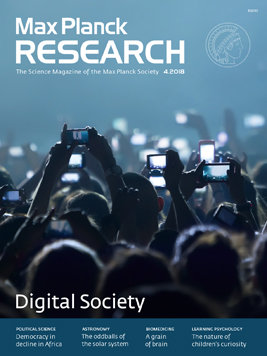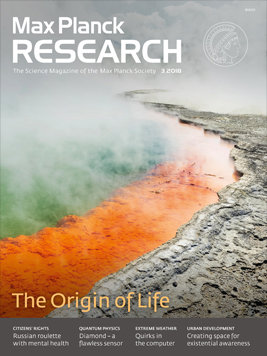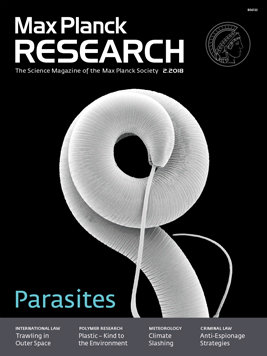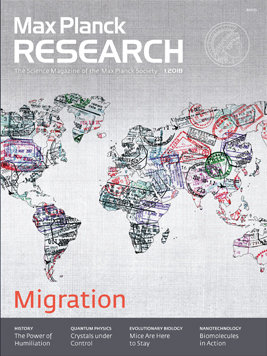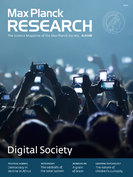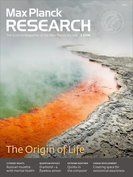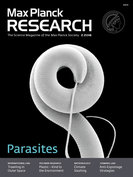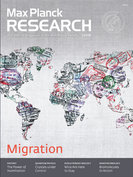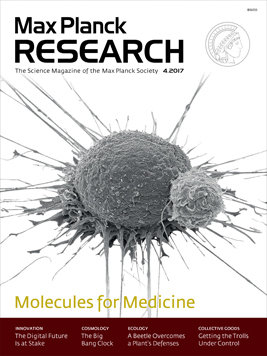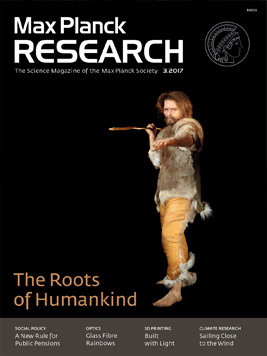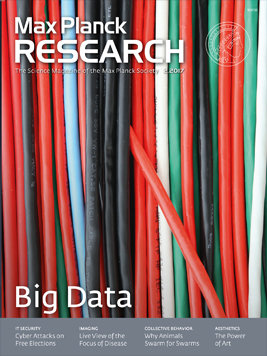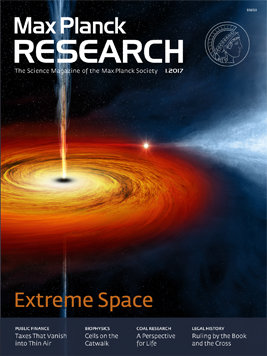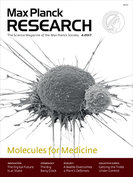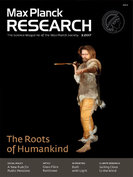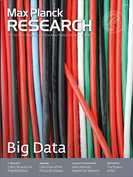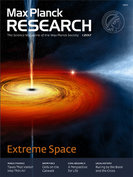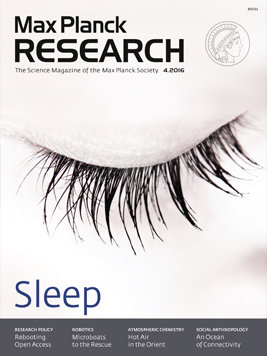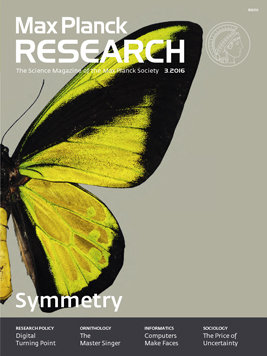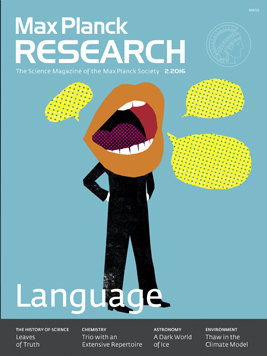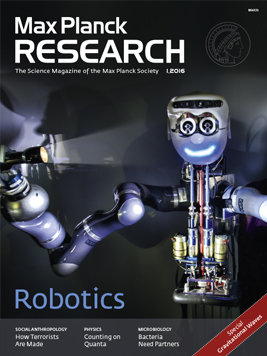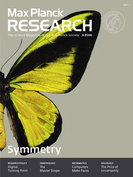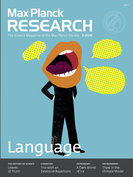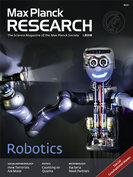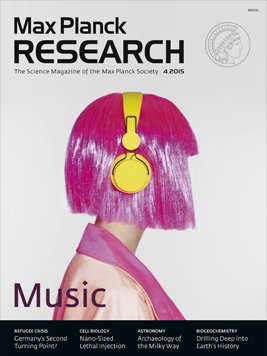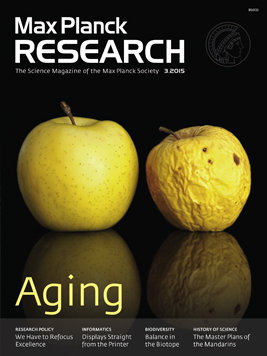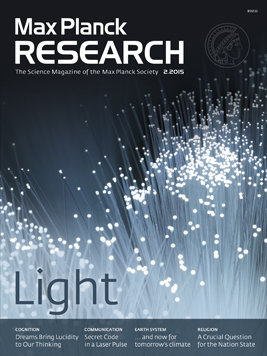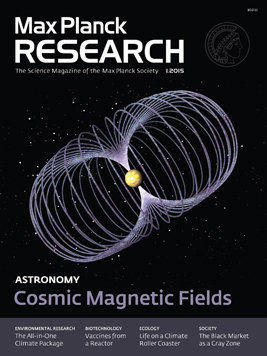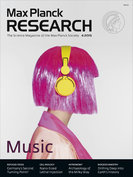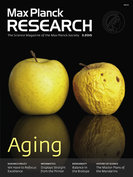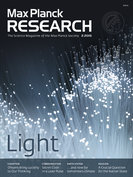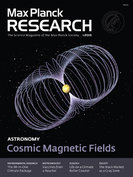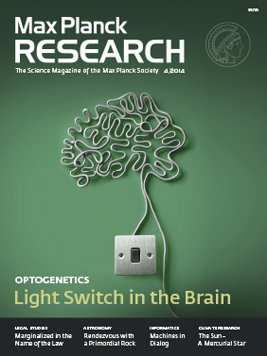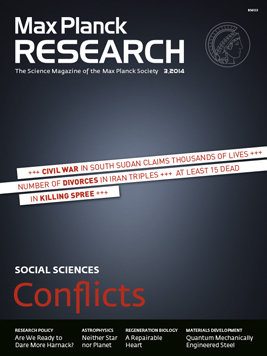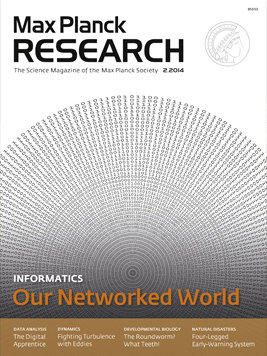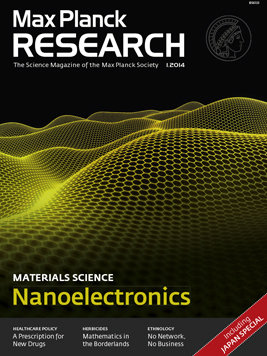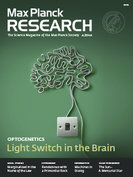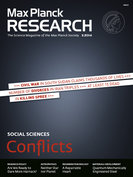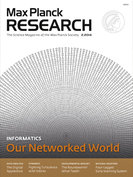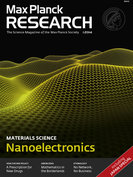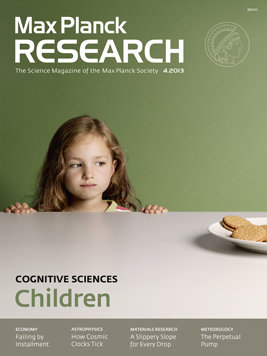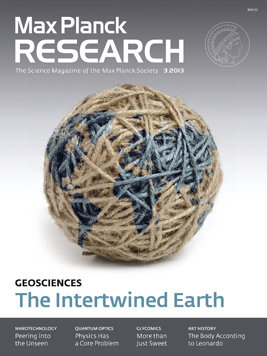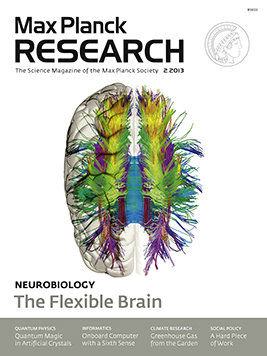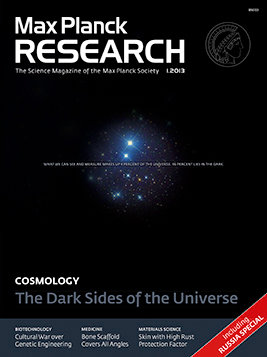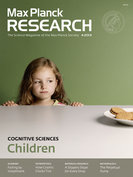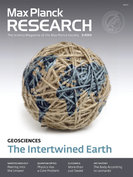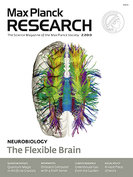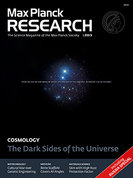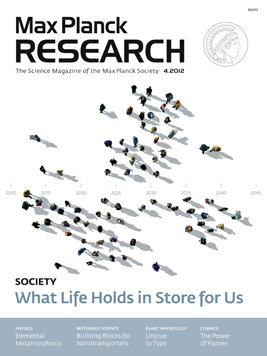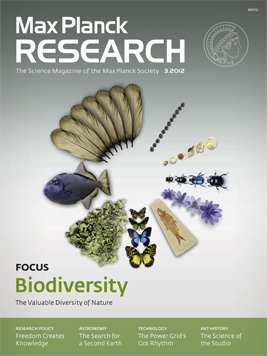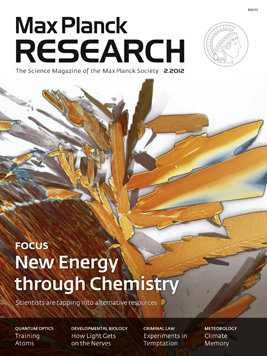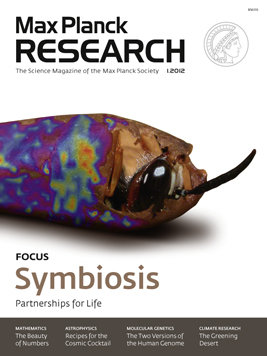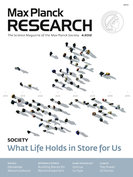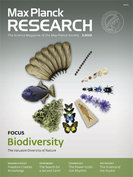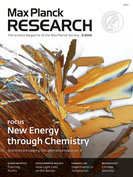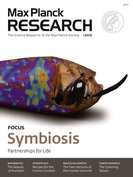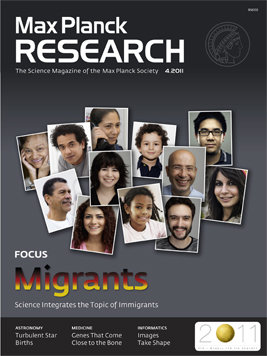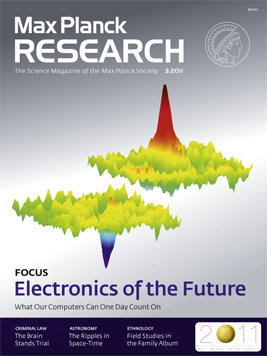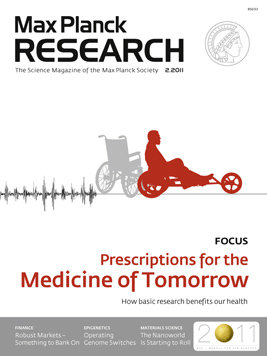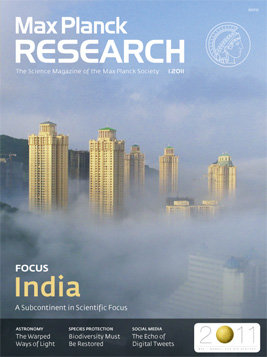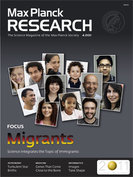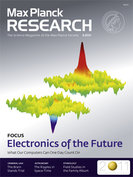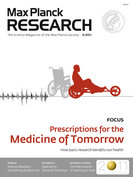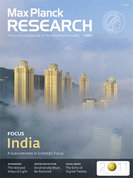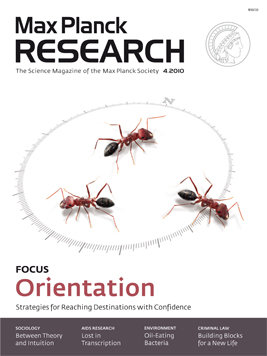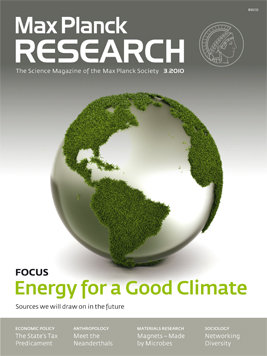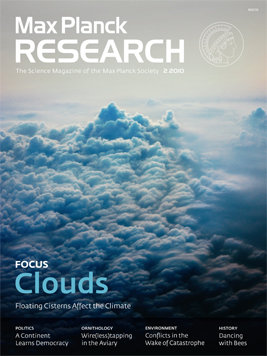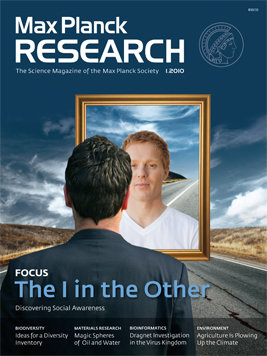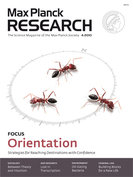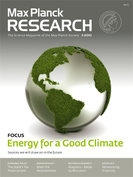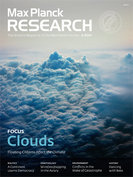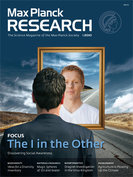MaxPlanckResearch science magazine
2023
Magazine 04/2023
Extreme cold drove people out of large parts of Europe during the last ice age until it became warmer again. Researchers at the Max Planck Institute for Evolutionary Anthropology are tracing these migratory movements. Today, excessively high temperatures are more of a concern, partly because they are melting the ice sheets of Greenland and Antarctica, causing sea levels to rise. Researchers at the Max Planck Institute for Meteorology are analysing the interactions between climate and ice sheets. Researchers at the Max Planck Institute for Extraterrestrial Physics are investigating how stars and planets form in clouds of cold dust and gas. They are also learning about the conditions under which life can develop.
Magazine 03/2023
Many people today find their way around with the help of navigation programs. How navigation works in the brain without a smartphone and to what extent it represents a blueprint for memory is being investigated by a team from the Max Planck Institute for Human Cognitive and Neuroscience. Even if we use digital aids for orientation, humans can still orientate themselves in unknown environments and situations much better than robots. Researchers at the Max Planck Institute for Intelligent Systems are teaching machines to learn new tasks and unfamiliar terrain more quickly. How we can orient ourselves in the mass of information on the Internet and debunk false claims is a topic at the Max Planck Institute for Educational Research.
Magazine 02/2023
The Earth: a pale blue dot in the darkness of space, a speck of dust in the light of the sun. This is how planetary scientist Carl Sagan described our planet. It is the home of all humans who have ever lived, and has been the stage for all the stories we know. From here, astronomers peer into a dynamic universe, witness the devilish dance of true mass monsters and gaze into our own past. How did the universe, our solar system, and our home come into being? Why is the Earth so unique? With its profound questions, astronomy brings us closer together, blurs boundaries and creates opportunities for the global South.
Magazine 01/2023
Providing security for its citizens is an essential task of a state. Security can be threatened from both the outside and from within. For example, in recent years there has been a rise in a new form of primarily right-wing extremist terrorism carried out by unorganized individual perpetrators. Max Planck researchers are investigating the factors that fuel this random terrorism and exploring potential solutions. IT security is also of significant social and economic relevance. A novel method can detect vulnerabilities in software that cybercriminals could exploit. The fact that security cannot always be achieved through harsh measures is evident in the penal system. The experiences of offenders in prison can hinder their rehabilitation process.
2022
Magazine 04/2022
Most of us take our senses for granted. We tend not to realise how important they are for us until one of our senses fails us. Hearing loss, for example, has a considerable impact on social life. In the future, some people who are not helped by ordinary hearing aids could benefit from an optical cochlear implant. But not all hearing is the same - people in different cultures perceive music differently. And there are also senses that humans do not possess: mole-rats, for example, use the earth’s magnetic field to orient themselves in their dark burrows.
Magazine 03/2022
Being mobile is a basic need for many people. But animals also travel long distances. Max Planck researchers look into the topic of mobility in various ways. For example, they are studying the changing livelihoods of the Wodaabe, a small subgroup of the Fulani ethnic group in Niger, which lead a life between savannah and city. Migration also plays a role in our culture. How do EU citizens feel in old age when they have left their original homeland? And then there are migratory birds, which follow a genetic program, as scientists discovered using the example of blackcaps.
Magazine 02/2022
In many modern societies, individuality is very important – going one's own way, even sometimes swimming against the tide. Life in a swarm is quite different: Each member must keep a constant eye on their neighbors and adapt their movements to the behavior of the others. The individuals follow strict rules. Whether it's swarm-like associations of immune cells that overwhelm pathogens in the body, huge schools of fish in the oceans, or mass panics of people like the one at the Love Parade in Duisburg or in Mecca – Max Planck researchers are studying swarms in all their facets.
Magazine 01/2022
“Pressure” is a word with many meanings. The first thing that may come to most people’s minds is the stress we encounter in our day-to-day lives. Max Planck researchers are investigating the genetic factors that influence human stress responses and the consequences stress can have on the body even before birth. But there is also pressure in the physical sense, where it has a positive effect and is indispensable for many processes. Pressure controls the constant remodelling of bones, for example, or helps to break down the electrical resistance of materials - at temperatures that are almost feasible. All these topics are the focus of the new issue.
2021
Magazine 04/2021
Our feelings play a significant role in determining our actions. But what actually are feelings? Until recently, they were considered elusive in science – too subjective and not exactly quantifiable. Yet they can certainly be measured on the basis of the physical reactions they evoke. And so researchers are getting to the bottom of them and developing improved therapies for people with arachnophobia, for example. They are teaching robots, which could one day help us care for people in need of assistance, how to feel properly. Furthermore researchers are investigating what influence emotions had on political events.
Magazine 03/2021
Artificial intelligence (AI) is increasingly finding its way into our everyday lives – whether in the smart home, music streaming or as a voice assistant. The technology is developing rapidly. For example, algorithms are being trained to estimate the risk of mental illness from many physiological parameters and clinical findings. But what criteria does AI use for its decisions, which often have far-reaching consequences? Researchers are exploring this as well as ethical questions. After all, we humans should still dictate to AI what it may and may not do. The "Focus" section of this issue provides some food for thought.
Magazine 02/2021
"Teamwork" is a natural requirement in many professions today. In fact, we humans have undisputedly achieved mastery when it comes to having each other`s back. Civil courage is an important part of our society. For science, it is just as much a topic as the search for the origins of community. To this end, researchers are running through evolution in fast motion and investigating how bacteria come together to form cell groups. Of course, animals also benefit from cohabitation. Baboons, for instance, who live in herds, work together in finding food and protecting each other.
Magazine 01/2021
Our planet provides a comfortable home for life. But in some places and at some times, it is quite uncomfortable on Earth: heat or cold, heavy precipitation or absolute drought, strong winds, lightning, volcanic eruptions or earthquakes threaten the existence of many living beings. The only chance is to adapt as well as possible to these inhospitable conditions and to live with them. How do plants cope with drought? Can extreme weather events be predicted? And what role do natural disasters play in art and culture? The articles in this issue's "Focus" provide answers.
2020
Magazine 04/2020
It may be a truism that no two eggs are alike. However, the search for the causes and the explanation for the small (or large!) difference is all the more exciting. A classic example is the identification of species in biology; for example, even closely related plants sometimes have very differently shaped leaves. In astronomy, on the other hand, researchers are investigating how different types of galaxies are formed and what role dark matter plays in this process. But it is not only nature that is diverse; humankind has also developed a variety of cultures that shape our perceptions and actions in different ways.
Magazine 03/2020
The Covid-19 pandemic is deepening the division in society and reinforcing growing social inequality in our country – a subject that we are taking a closer look at in this issue's Focus. In addition, the pandemic has also brought about major changes in the relationship between the state and the economy. While politics had long withdrawn from economic activities, researchers now recognise the opposite trend. But the coronavirus has also brought the immune system into focus, which needs to strike a balance between defending against foreign pathogens, while also not overreacting and causing harm to the body’s own cells.
Magazine 02/2020
Who thinks of physics or neurobiology when listening to ‘Bad Guy’’ by Billie Eilish or Beethoven's 9th Symphony? Hearing has to do with sound, which reaches the ear in the form of waves and is finally processed by the brain. We perceive some sounds or noises as pleasant, others not. But there are many frequencies that we do not perceive at all, such as ultrasound. This is how bats locate their prey at night. Researchers use ultrasound to combine tiny particles into three-dimensional structures and create acoustic holograms that may one day be used in medicine.
Magazine 01/2020
This issue of our research magazine presents itself in a fresh, crisp new look: which is only fitting, as "change" is the topic at the heart of this issue. Global crises, above all human-made climate change, determine and affect our daily lives. It is no coincidence that "bio-economy" is the topic of the Science Year 2020. Max Planck researchers have a lot to contribute to this subject and their approaches show that a green economy offers more opportunities than just replacing fossil raw materials - it also enables completely new types of chemical production. But how can economic change succeed?
Magazine Sp/2020
Max Planck Innovation has been the link between science and industry since 1970. The Max Planck Society's technology transfer organization supports researchers in assessing the potential of an invention and applying for patents. In addition, it markets patents, technologies, and know-how to industry and assists founders in setting up companies that translate research results from the Max Planck Society into products and services.
2019
Magazine 04/2019
Learning, i.e. the acquisition of skills, follows complex rules and principles - whether in humans, animals, or the world of computers. In any case, the learning of living creatures requires mental peak performance – be it in language acquisition in childhood, or when birds learn to sing. Machine learning, on the other hand, requires sophisticated algorithms and large data sets so that a computer can interpret human eye movements, for example. Researchers of the Max Planck Society are working on all these topics.
Magazine 03/2019
For 70 years, the German Basic Law has safeguarded fundamental rights and freedoms. Academic freedom is essential for science. One aspect of this issue of our magazine is how such freedom has developed over the centuries. But freedom is also the subject of research itself. Researchers are investigating the state of judicial independence and how people experienced the transition from the GDR to the liberal Western system.
Magazine 02/2019
What does the energy of the future look like? This question is the focus of this edition of our science magazine. With nuclear fusion, Max Planck researchers are breaking new ground in producing large quantities of electricity in a way that conserves resources. Fundamental physical and technical problems, however, are still open. Scientists are also working on suitable storage facilities for wind and solar power. And they are looking for catalysts and production processes to harness carbon dioxide.
Magazine 01/2019
The European Union is currently experiencing several crises. Brexit is only one of them and probably not even the most serious one. Max Planck researchers are almost more concerned about the diverging views of the rule of law and the massive structural inequalities between the EU members. A look at the history of the international community, however, also shows that Europe has mastered many serious crises in the past – from which we can gain insights into the current situation.
2018
Magazine 04/2018
The digitalization of our society is advancing at an ever faster pace – a development that necessitates completely new security strategies. These are also a challenge for research: How can fake news in social media be effectively combated? How can we ensure that robot carers equipped with artificial intelligence act in the spirit of the inventor? And what about the pictures of us that appear on Facebook? Max Planck scientists are looking for solutions to all these problems.
Magazine 03/2018
The question of the origins of life still remains an open problem. Various groups at Max Planck Institutes are investigating this genuinely existential question. Some scientists, for example, suspect that the building blocks for organisms have literally fallen from the sky. Other researchers are also focusing on the role played by RNA molecules in the development of life, as well as the problem of the first cells – and experts in the lab are investigating the dynamics of biomembranes.
Magazine 02/2018
About 40 percent of all species on earth live parasitically. Even in our genome, countless small sections multiply at its expense. Max Planck researchers are investigating how these 'DNA parasites' work, as well as the various tricks used by sticklebacks and their parasites. In addition, the scientists are studying small threadworms which live in the intestines of humans and animals and have a unique life cycle.
Magazine 01/2018
Migration is currently one of the most relevant socio-political issues. When people are fleeing unbearable conditions in their home country, or seek to improve the circumstances of their lives, specific rules apply. Max Planck scientists investigate the needs and goals of refugees and examine how they can successfully settle into their new lives. The researchers also analyze the exclusion of migrants and explore under which conditions different cultures can live together peacefully.
2017
Magazine 04/2017
Medical practitioners want safe diagnoses and drugs with as few side effects as possible. To this end, Max Planck researchers are seeking to identify substances in nature that could benefit humans. In addition, they are expanding proteins into sophisticated transporters in the field of nanomedicine. What is more, our scientists want to use positron emission tomography, widely used in cancer diagnostics, for other diseases as well, with the help of appropriate tracer substances.
Magazine 03/2017
"Where did we come from?” is one of the fundamental questions of humankind. Archaeologists, anthropologists and geneticists are finding more and more clues about where the first humans came from, how they spread throughout the world and how they lived.
Magazine 02/2017
We live in the Information Age. The amount of data flowing through networks is increasing exponentially. Structuring and using this big data, as experts refer to it, in a meaningful way is becoming more and more challenging. New technologies are needed to manage the torrent. Max Planck researchers, for example, are searching for astronomical objects with special software, as well as seeking unexpected correlations and questions, or looking into the scientific history of huge quantities of data.
Magazine 01/2017
On a clear night, the starry sky appears calm and peaceful. In reality, however, all hell breaks loose in the heavens: stars absorb matter from other stars, suns explode and black holes greedily devour gas and dust. In short, there are a lot of extreme places in the universe – and they hold particular appeal for researchers. Max Planck astronomers investigate supernovas, study the properties of black holes and conduct research on what causes particles to accelerate.
2016
Magazine 04/2016
Sleep is a basic need and essential for learning and memory function. Our internal body clocks control the day-night rhythm, influencing the desire for rest – in humans as well as in many animals. Max Planck researchers investigate these organic clocks and other related aspects. For example, they study frigate birds that slumber during flight or the link between sleep disorders and depression.
Magazine 03/2016
It’s found in the basic building blocks of matter and in the vast expanses of the universe, in flowers, in butterflies and in our own bodies: symmetry is deeply embedded in nature. Perfect symmetry, however, is rare, and it is often precisely the little differences that offer the key advantage for our existence. To understand this phenomenon, researchers are studying such topics as antimatter, the human brain, or the development of flatworms.
Magazine 02/2016
Language is the most important form of communication. But how has this instrument evolved in the course of evolution? And what is happening in our brains when we are having a conversation with someone? Language proves to be extraordinarily complex. And as our articles show, the topic is not only interesting for classical linguists and computer scientists, but also for psychologists and behavioural scientists.
Magazine 01/2016
Robots are the superstars of the future. They are to drive cars, administer care to people in hospitals and homes, save lives after catastrophes, or perform medical tasks as tiny helpers in the body. Max Planck researchers are working hard to ensure that these scenarios become a reality one day. But at first, they have to overcome many challenges.
2015
Magazine 04/2015
If polls are to be believed, a quarter of all Germans listen to one hour of music a day. Max Planck researchers carry out extensive research into the subject of music. They look into the origins of musical preferences and their changes, investigate the changing emotions and moods in the musical life of Europe, and experiment with powerful machines which produce sounds.
Magazine 03/2015
Virtually all organisms and living beings have to submit themselves to the natural aging process. But how does this process work? The Max Planck researchers whose work we report investigate fish or a freshwater polyp which have almost attained immortality. And they grapple with the social consequences of age in humans - when it comes to retirement after an active working life.
Magazine 02/2015
Light is the elixir of life, inspiration for artists and an indispensable tool in science and technology. Reason enough for UNESCO to proclaim 2015 as the International Year of Light. And a good opportunity to dedicate the focus of our magazine to this topic: discover how Max Planck scientists work with optical tweezers, film the movements of electrons, or analyse the painting by Caravaggio.
Magazine 01/2015
Magnetic fields are ubiquitous in the literal sense: they exist around planets, traverse our Milky Way and distant galaxies, and are not only present in galactic gas, but can also be found in the suns that evolve from such gas. Magnetars, for example, neutron stars that are only about 20 kilometers in diameter, have the strongest magnetic fields in the universe. Max Planck researchers learn a lot about the nature of the heavenly bodies by studying the cosmic phenomenon.
2014
Magazine 04/2014
The discovery of light-sensitive channel proteins in the 1970s and 1980s hardly made a splash outside the scientific community. Initially, no one suspected that these ion channels would become a popular tool for neurobiologists. Today, neuroscientists can use tailor-made proteins to switch individual neurons on and off. This does not only make it possible to investigate the function of neurons in the brain, but also offers promising applications in medicine.
Magazine 03/2014
Conflicts divide and cause injury. They are omnipresent, in our personal environment and in society alike, at the national level no less than in the international context. At the same time, conflicts are a fertile field of study for researchers from various disciplines, such as social anthropologists or researchers of law or human development. They consider the issue in all of its facets and from different perspectives.
Magazine 02/2014
Our daily life is increasingly dominated by computers - whether we like it or not. This digital network is both a blessing and a curse. The vast amounts of personal data we leave behind can easily get into the wrong hands. Max Planck researchers are now working on developing a "protective cover". They also use sophisticated computer technology to communicate with immobilized patients and work on absolutely reliable security systems, for example, for cars.
Magazine 01/2014
Tomorrow's electronics are diverse. Above all, they take place on the smallest scale. On the nanometre scale, researchers today are already juggling the most varied ingredients: various organic substances on a molecular level or graphene which shows unusual mechanical or electronic characteristics. In the quantum world, scientists encounter superconducting structures & investigate the basic principles of so-called spintronics.
2013
Magazine 04/2013
Children have to learn a lot: how to talk, read, and write, but also social skills such as compassion and empathy or the ability to control impulses. Some traits, such as the willingness to help others, appear innate. Anthropologists, educational researchers and neuroscientists are investigating how the social behaviour of children changes over the course of time and which brain areas play a role in this.
Magazine 03/2013
Earth is a perfect ecosystem and the best place for life which we know in the universe. The complex interaction between the elements earth, water and air – land masses, oceans, and atmosphere – is finely balanced and functions smoothly. But this fragile interplay can easily go wrong. Researchers are gradually puzzling out the factors throwing our intertwined earth out of balance.
Magazine 02/2013
The cosmos of the brain is in a constant state of change. Useless connections are cut and new ones are formed to keep the brain flexible and adapt to the constantly changing requirements. Scientists use sophisticated techniques to visualize the brain’s circuit diagrams. Diffusion tensor imaging, for instance, shows the complex patterns of nerve fibers.
Magazine 01/2013
“Those in the darkness you don’t see.” Modern cosmology lends thisline from “The Ballad of Mack the Knife” in Brecht’s Threepenny Opera an unexpected currency: the universe lies largely in darkness. This doesn’t refer to the fact that the night sky is black, but rather that dark energy and dark matter – two previously completely unknown substances – account for 96 percent of the total cosmic mass.
2012
Magazine 04/2012
The only constant thing is change - this statement by the ancient Greek philosopher Heraclitus is even more true for today's society. The fact that our society is getting increasingly older, for example, transforms our lives in every aspect. New findings from happiness research and political sciences will also play a decisive role in the future.
Magazine 03/2012
Whether in the water, in the air or on land: life is diverse. This is not only true for the global diversity of species, but also for the genetic variation among species, or the broad variety of different kinds of ecosystems. In the current MaxPlanckResearch magazine, researchers provide insights into this kaleidoscope of variation.
Magazine 02/2012
Discovering new, renewable energy sources while simultaneously protecting the environment – these are some of the challenging goals that scientists have in their sights on. Max Planck researchers are currently working on methods that would allow us one day to use the vast quantities of CO2 in the atmosphere or wood chips, which are generated as a by-product of the timber industry, as chemical raw materials.
Magazine 01/2012
If dissimilar couples enter into a union for life, the relationship doesn't necessarily have to fail. On the contrary: such partnerships have decisively shaped the evolution of our planet. Max Planck researchers examine symbioses in animals & plants - discovering fascinating details. Bacteria, for example, produce protective antibiotics for insect larvae or help deep sea muscle in the provision of energy.
2011
Magazine 04/2011
Every fifth German has a migration background - that corresponds to more than 16 million people. Not only politicians and authorities must respond to this demographic trend. Researchers also increasingly turn their attention to the subject of migration. In this issue of our research magazine, Max Planck scientists examine the topic from three different angles.
Magazine 03/2011
In the future, will we transport computer chips on banknotes, roll up our monitors before putting them into our pockets, and store and access ever larger volumes of data on our PCs in a very fast and easy manner? Max Planck researchers are working on "organic electronics" and nano storage units in order to ensure that such scenarios eventually become part of our everyday lives.
Magazine 02/2011
A long life in perfect health – this is what humans have always dreamed of. While modern medicine is far from being able to fulfill this dream, basic research helps us understand our bodies better and to treat diseases in a more targeted manner.
Magazine 01/2011
India is currently experiencing an "economic miracle" and one of the most important growth markets worldwide. And it is also developing into a hub for research of the highest international calibre. All this is reason enough for Max Planck scientists to collaborate with Indian colleagues – or to turn the subcontinent itself into the object of their research.
2010
Magazine 04/2010
If you want to reach a specific destination, you need detailed information about your environment. To this end, both humans and animals use various strategies. Max Planck researchers have now attempted to unravel the secrets of orientation by means of sophisticated experiments.
Magazine 03/2010
Our energy needs are growing rapidly, while at the same time conventional sources of energy such as fossil fuels endanger the climate. Basic researchers are working on new concepts so that our earth will remain green.
Magazine 02/2010
Clouds are far more than the objects of romantic musings - they are an important factor in the global climate system. Scientists want to understand the structure as well as chemistry and physics of these floating water reservoirs.
Magazine 01/2010
In order to live as a part of society we must understand others. This requires social awareness. Max Planck researchers investigate how this skill has developed and how we read each other's minds.
